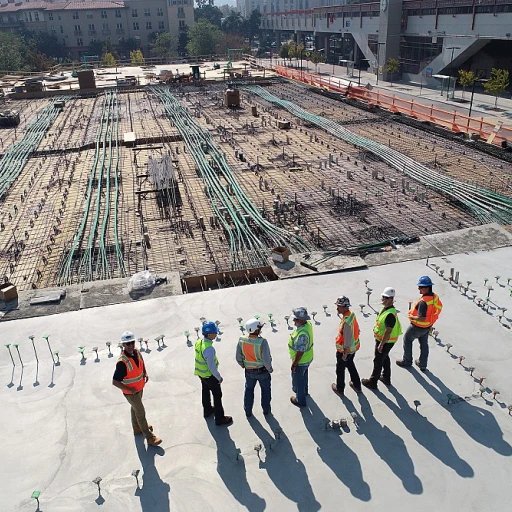
The Core Responsibilities of an HR Recruiter
Key Obligations of the HR Recruiter
An HR recruiter plays a pivotal role in the hiring process, carrying the weight of numerous key obligations. It is more than just sourcing potential candidates; it involves collaboration with hiring managers to ensure the company attracts top-tier talent. Here is a closer look at the main content of their responsibilities:- Crafting Job Descriptions: A recruiter must create comprehensive and attractive job descriptions to reflect the role requirements accurately. The clarity and appeal of these descriptions can significantly impact the quality of candidates applying for the job.
- Talent Acquisition and Sourcing: An experienced recruiter employs various strategies to search for and fill job positions. They engage in active candidate sourcing, including utilizing job boards, professional networks, and social media platforms to attract the right talent. This practice not only involves finding candidates online but also nurturing relationships with them; it's the lifeblood of an effective recruitment strategy.
- Evaluating Candidates: Assessing the skills and experience of candidates is fundamental to ensuring the right fit for the company. This entails rigorous screening processes and prepares the recruiter for subsequent responsibilities involving interviews.
- Conducting Interviews: Conducting professional and insightful recruiter interview sessions allows recruiters to gain deeper knowledge of candidates' skills, expertise, and how they align with the company's values and culture.
Essential Skills for Effective Candidate Sourcing
Key Skills to Source Talent Effectively
In the vast realm of candidate sourcing, an HR recruiter must hone a specific set of skills to perform their job effectively. With the end goal of filling job positions with the top candidates, recruiters need to be equipped with a comprehensive skill set that goes beyond reading job descriptions and conducting interviews.
- Networking Prowess: A successful recruiter knows how to expand their network and reach potential candidates using various channels such as job boards, social media, and even referrals. Networking is essential in identifying hidden talent that might not be actively seeking employment but would fit perfectly with a company's needs.
- Deep Understanding of Job Descriptions: Possessing an intricate knowledge of job descriptions is paramount. This involves not just understanding the technical requirements of each role, but also the company's culture and values, which are of equal importance when assessing candidate fit.
- Interviewing Acumen: Crafting relevant interview questions and conducting insightful interviews help recruiters assess a candidate's suitability. Interviewing isn't just about ticking boxes but delving deeper into a candidate's experience and vision to determine if they align with the company's strategic objectives.
- Analytical Skills: Recruiters are responsible for analyzing trends in recruitment processes—understanding which channels yield the best talent, gauging the competitive landscape, and recognizing patterns in recruiter interview success. These insights drive smarter talent acquisition strategies.
- Building and Maintaining Relationships: Building strong, trusting relationships with both hiring managers and candidates is crucial. A resources recruiter should strive to act as a mediator who balances both parties' needs and expectations to successfully conclude the hiring process.
Acquiring these skills ensures that HR specialists effectively match the right candidates with the right job descriptions, creating a dynamic and productive workforce.
Navigating the Challenges in Candidate Sourcing
Confronting Recruitment Complexities
Recruiters often face diverse challenges in the realm of candidate sourcing. Understanding these obstacles is vital in navigating this critical component of the hiring process. Recruiters must fill job vacancies efficiently, but potential roadblocks such as talent shortages and shifting job market trends can hinder recruitment efforts. The landscape of available talent is constantly evolving, often creating a disparity between available candidates and the skills required by employers. It is essential to maintain a deep understanding of the job descriptions and required skills experience when sourcing candidates to meet hiring managers' expectations.Adaptability in an Ever-Changing Environment
Recruiters must remain agile to adapt to fluctuating hiring demands. Human resources professionals need to keep enhancing their skills through continuous learning and adaptation. By attending workshops, webinars, and industry seminars, they can remain informed of recruitment trends and technologies. The knowledge acquired can significantly improve their ability to source top talent and manage the hiring process more effectively. Leveraging technology becomes indispensable, especially with the emergence of advanced recruitment platforms and tools that streamline the process of identifying suitable talent. Human resources specialists are now required to master digital tools and platforms, such as social media and job boards, which have become instrumental resources for identifying candidates online. hiring process Recruiters must also conduct effective recruiter interviews to gauge prospective hires' suitability and skills. Careful preparation of interview questions that align with the job description template ensures a more focused and productive discussion. This attention to detail can uncover whether candidates possess the required skills and experience necessary to thrive in the described role. Ultimately, successful recruiters must continue to prioritize building strong relationships with candidates and hiring managers alike, ensuring a transparent and efficient recruitment journey.Leveraging Technology in Recruitment
Harnessing Technological Tools for Recruitment Success
In today's dynamic landscape, leveraging technology is an invaluable practice for any resourceful recruiter seeking to fill job positions efficiently. The recruitment process, laden with numerous steps from job descriptions to interviews, can be significantly streamlined through modern technological solutions. Recruitment technology, such as AI-powered platforms and Applicant Tracking Systems (ATS), enhances the ability of recruiters to manage a vast pool of candidates, discerning the skills and experience that align with specific job descriptions. These systems adeptly sift through applicant data, identifying top talent faster than traditional manual processes, and alleviating some of the challenges faced in candidate sourcing. To engage potential candidates, social media and job boards play a crucial role. Recruiters can optimize these channels to reach a wider audience, increasing the chances of attracting the right talent. Crafting engaging job posts imbued with clear, concise job descriptions and role requirements is key in capturing candidate interest online. Moreover, video interview platforms have emerged as a valuable resource for human resources teams, enabling them to conduct initial candidate assessments remotely, saving time and enhancing the hiring process. This technological integration guards against geographical constraints, thus widening the recruitment net. Recruiters with specialist skills in technology not only streamline their workflow but also foster stronger collaborations with hiring managers. By utilizing tech tools adeptly, a recruiter human resources professional can effectively align company objectives with talent acquisition strategies, ensuring a seamless fit between potential candidates and the roles they aspire to fill. By keeping abreast of technological advancements, recruitment specialists enhance their capabilities, bringing forth efficiencies that drive successful and fulfilling hiring experiences.Building a Strong Employer Brand
Crafting an Attractive Employer Image
Creating a strong employer brand is pivotal in the world of candidate sourcing. For an HR recruiter, building an appealing company image isn't just about aesthetics; it's about conveying the core values and working environment to attract top talent. An experienced resources recruiter understands the necessity of portraying the company as a desirable place to work, which can significantly influence the recruitment process and the caliber of potential candidates.- Authentic Message: An essential aspect of branding is staying genuine. The company's mission and vision should align with how managers and employees perceive the organization. This alignment helps recruiters provide truthful job descriptions and set realistic expectations for job seekers.
- Leverage Social Media: Utilizing social media platforms allows companies to reach a broader audience of potential candidates online. Sharing relevant content about the working environment, employee experiences, and company achievements can enhance the company's image in the eyes of job seekers.
- Consistent Communication: Consistency is key. HR recruiters must ensure messages conveyed in job postings and during interviews align with the company's brand. This consistency helps to maintain a cohesive image which job candidates find attractive and credible.
- Employee Advocacy: Encouraging current employees to become brand ambassadors can significantly impact how the organization is perceived. Their authentic testimonials and experiences can serve as powerful endorsements that resonate with potential hires.
Continuous Learning and Adaptation
Embracing Continual Growth in Recruitment
In the fast-paced world of human resources, especially in the realm of recruiter roles, continuous learning is not just beneficial; it's essential. Staying updated with the latest trends in candidate sourcing and recruitment enhances the capabilities of recruiters, enabling them to efficiently fill positions and attract top talent. Cultivating a mindset focused on growth ensures that recruiters develop and hone their skills throughout their careers. Here are a few strategies to consider:- Engage with Industry News: Keeping a pulse on industry developments, such as changes in recruitment technology or shifts in job board popularity, equips recruiters with the knowledge needed to refine their approaches and optimize job postings.
- Participate in Workshops and Training: Skill workshops and online courses can help recruiters stay adept at crafting effective job descriptions and identifying potential candidates. The opportunity to learn from field experts can significantly enhance a recruiter’s experience.
- Network with Other Recruiters: Engaging with peers and attending professional meetups allows recruiters to share best practices and experiences. This collaborative approach leads to broader perspectives and innovative strategies in candidate sourcing and job interview processes.
- Seek Feedback from Hiring Managers: Regularly seeking insights from hiring managers provides valuable input on how effectively recruitment strategies align with company goals. Feedback can reveal areas for improvement in the hiring process, ensuring a seamless collaboration between recruiters and their human resources counterparts.













